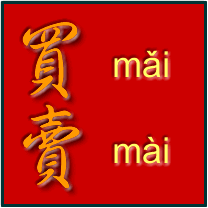
The words for to buy and to sell are very similar in Mandarin: 買 [买] (mǎi) [maɪ˦˩˧] = buy and 賣 [卖] (mài) [maɪ˥˩] = to sell. In Cantonese the characters are the same, but are pronounced maai5 [maːi˩˧] (buy) and maai6 [maːi˨] (sell) [source]. The only difference between them is in the tones, and they are easily confused by learners. Do native speakers ever mix them up?
The character 買 combines 网 (wǎng – net) and 貝 (bèi – shell, cowrie) [source], and 賣 combines those elements plus 出 (chū – go out), which became reduced to 士 (shì – soldier) over time [source].
If you put these two characters together: 買賣 [买卖] (mǎimài) it means business, shop, store or deal [source].
Do any other languages have words for buy and sell that are so similar?
Buying and selling both involve an exchange of goods or services. The only difference is in the direction of the exchange. I might sell something to you, or buy something from you, while you might sell something to me, or buy something from me.
The same is true of other pairs of words such as borrow and lend. The one you use depends on the direction of the exchange: I borrow from you, and you lend to me. Teach and learn are also similar: You teach me, and I learn from you, or I teach you, and you learn from me. Although in some varieties of English learn is used to mean learn and teach.
In Welsh the word dysgu means to learn and to teach, and benthyca means to borrow and to lend. The word addysgu, means to teach, but it isn’t used much in colloquial Welsh [source].
Are there any other languages that don’t make a distinctions like this?
Is there a linguistic term for word pairs like this?
I don’t think it is necessary for pairs like give–take, sell–buy, lend–borrow etc. to have two different verbs at all. Using directional indicators (prepositions to–from, grammatical case, or some other device) to distinguish them does pretty much the same job. Remember that “lend” and “borrow” are one word in Mandarin Chinese (借, jiè), most varieties of German (“leihen” and less frequently “borgen” depending on dialect), and many English dialects (often “lend” but “borrow” in the Upper Midwestern US and in Malaysia, according to Wiktionary).
The tone of Standard Chinese 買/买 mǎi should be [maɪ˨˩˦] — it is essential that it starts rather low-pitched —, and 買賣/买卖 is pronounced mǎimai with the second syllable in the neutral tone, though in the “deal/transaction” sense some Mandarin speakers do say mǎimài.
In French apprendre can mean both teach and learn. If you want to disambiguate you can say enseigner for teach. Likewise prêter can mean both lend and borrow.
In Gaelg (Manx Gaelic), gynsaghey means both ‘teach’ and ‘learn’, as in French. However, there is a distinction between ‘teacher’ (ynseyder) and ‘learner’ (ynseydagh).
The lack of distinction between teach:learn does exist in some English dialects of northern England, e.g. Geordie (Tyneside English):
“For instance, when a Geordie uses the verb larn, meaning ‘to teach’, it is not a misuse of the Standard English verb learn (c.f. modern German lernen), rather it is the modern reflex of the Anglo-Saxon verb læran, meaning ‘to teach’”
http://www.bl.uk/learning/langlit/sounds/case-studies/geordie/lexis/
https://en.wiktionary.org/wiki/larn
In Spanish lend and borrow are a bit like this. To lend = prestar; to borrow “pedir prestado”- the latter meaning “to ask (to be) lent” .
In Esperanto ‘pruntedoni’ mean ‘lend and ‘pruntepreni’ means ‘borrow’.
I have often heard, but never seen in print ‘prunteŝteli’ meaning both – but with the hint that the borrowed / loaned item will not be returned.
As I native speaker of Cantonese, I don’t recall encountering situations where people confuse 買 and 賣. But on a related topic, there is a tendency for some people in Hong Kong to mispronounce certain words that are of tone 3 as tone 5… e.g. mispronouncing 舍 as 社 (I often heard people on HK radio shows saying, unwittingly, that they stayed at travel agencies(旅社) while backpacking!) or 使 as 市. BTW Simon, it was nice meeting you at the Polyglot Gathering this year!